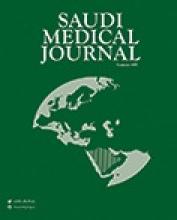Research ArticleOriginal Article
Open Access
Frequency and factors associated with inadequate self-care behaviors in patients with type 2 diabetes mellitus in Najran, Saudi Arabia
Based on diabetes self-management questionnaire
Awad M. Al-Qahtani
Saudi Medical Journal September 2020, 41 (9) 955-964; DOI: https://doi.org/10.15537/smj.2020.9.25339
Awad M. Al-Qahtani
From the Department of Family and Community Medicine, College of Medicine, Najran University, Najran, Kingdom of Saudi Arabia
MBBS, MD
References
- ↵International Diabetes Federation Prevalence of diabetes in Saudi Arabia, cited 2020 March 5. Available from: https://idf.org/our-network/regions-members/middle-east-and-north-africa/members/46-saudi-arabia.html.
- ↵
- World Health Organization
- ↵
- International Diabetes Federation
- ↵
- Alhowaish AK
- ↵
- Ishak NH,
- Mohd Yusoff SS,
- Rahman RA,
- Kadir AA
- ↵
- Ahmed Z,
- Yeasmeen F
- ↵
- Schmitt A,
- Reimer A,
- Hermanns N,
- Huber J,
- Ehrmann D,
- Schall S,
- et al.
- ↵
- Tiruneh SA,
- Ayele AA,
- Emiru YK,
- Tegegn HG,
- Ayele BA,
- Engidaw MT,
- et al.
- ↵
- ↵
- Al Johani KA,
- Kendall GE,
- Snider PD
- ↵
- Al-Khaledi M,
- Al-Dousari H,
- Al-Dhufairi S,
- Al-Mousawi T,
- Al-Azemi R,
- Al-Azimi F,
- et al.
- ↵
- AlShareef SM,
- AlWabel AA,
- AlKhathlan MA,
- AlKhazi AA,
- AlMaarik AK,
- AlGarni AM,
- et al.
- ↵
- Alvarado-Martel D,
- Fernandez MA,
- Vigaray MC,
- Carrillo A,
- Boronat M,
- Montesdeoca AE,
- et al.
- ↵
- Bukhsh A,
- Lee SWH,
- Pusparajah P,
- Schmitt A,
- Khan TM
- ↵
- Hilliard ME,
- Powell PW,
- Anderson BJ
- ↵
- Schmitt A,
- Reimer A,
- Hermanns N,
- Huber J,
- Ehrmann D,
- Schall S,
- et al.
- ↵
- Bukhsh A,
- Khan TM,
- Nawaz MS,
- Ahmed HS,
- Chan KG,
- Lee LH,
- et al.
- ↵
- American Diabetes Association. Standards of medical care in diabetes-2016. Abridged for primary care providers
- ↵
- Schmitt A,
- Hermanns N,
- Kulzer B,
- Reimer A,
- Schall S,
- Haak T
- ↵
- Alrahbi H
- ↵
- American Diabetes Association (ADA) Standards of Medical Care in Diabetes-2020
- ↵
- World Health Organization. Obesity:preventing and managing the global epidemic
- ↵
- Nejaddadgar N,
- Solhi M,
- Jegarghosheh S,
- Abolfathi M,
- Ashtarian H
- ↵
- Totesora D,
- Ramos-Rivera MI,
- Villegas-Florencio MQ,
- Reyes-Sia PN
- ↵
- Ang JY,
- Leo JS,
- George D,
- Chan HK
- ↵
- Bukhsh A,
- Khan TM,
- Nawaz MS,
- Ahmed HS,
- Chan KG,
- Goh BH
- ↵
- Wade T,
- Fahey O,
- Vanmieghem M,
- Vivian E
- ↵
- Al-Shayban DM
- ↵
- Kakade AA,
- Mohanty IR,
- Rai S
- ↵
- Almutairi KM
- ↵
- Edelman SV
- ↵
- Department of Health Survey UK
- ↵
- ↵
- Al-Hamad Z
- ↵
- Adu MD,
- Malabu UH,
- Malau-Aduli AEO,
- Malau-Aduli BS
- ↵
- Jackson IL,
- Adibe MO,
- Okonta MJ,
- Ukwe CV
- ↵
- Eid LP,
- Leopoldino SAD,
- Ollerm GASAO,
- Pompero DA,
- Martins MA,
- Gueroni LPB
In this issue
Frequency and factors associated with inadequate self-care behaviors in patients with type 2 diabetes mellitus in Najran, Saudi Arabia
Awad M. Al-Qahtani
Saudi Medical Journal Sep 2020, 41 (9) 955-964; DOI: 10.15537/smj.2020.9.25339
Jump to section
Related Articles
- No related articles found.
Cited By...
- No citing articles found.





